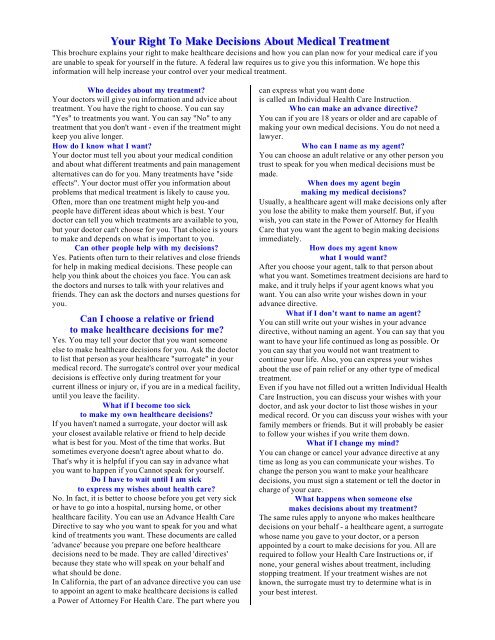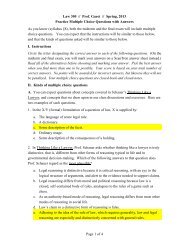Your Right To Make Decisions About Medical Treatment
Your Right To Make Decisions About Medical Treatment
Your Right To Make Decisions About Medical Treatment
Create successful ePaper yourself
Turn your PDF publications into a flip-book with our unique Google optimized e-Paper software.
<strong>Your</strong> <strong>Right</strong> <strong>To</strong> <strong>Make</strong> <strong>Decisions</strong> <strong>About</strong> <strong>Medical</strong> <strong>Treatment</strong><br />
This brochure explains your right to make healthcare decisions and how you can plan now for your medical care if you<br />
are unable to speak for yourself in the future. A federal law requires us to give you this information. We hope this<br />
information will help increase your control over your medical treatment.<br />
Who decides about my treatment?<br />
<strong>Your</strong> doctors will give you information and advice about<br />
treatment. You have the right to choose. You can say<br />
"Yes" to treatments you want. You can say "No" to any<br />
treatment that you don't want - even if the treatment might<br />
keep you alive longer.<br />
How do I know what I want?<br />
<strong>Your</strong> doctor must tell you about your medical condition<br />
and about what different treatments and pain management<br />
alternatives can do for you. Many treatments have "side<br />
effects". <strong>Your</strong> doctor must offer you information about<br />
problems that medical treatment is likely to cause you.<br />
Often, more than one treatment might help you-and<br />
people have different ideas about which is best. <strong>Your</strong><br />
doctor can tell you which treatments are available to you,<br />
but your doctor can't choose for you. That choice is yours<br />
to make and depends on what is important to you.<br />
Can other people help with my decisions?<br />
Yes. Patients often turn to their relatives and close friends<br />
for help in making medical decisions. These people can<br />
help you think about the choices you face. You can ask<br />
the doctors and nurses to talk with your relatives and<br />
friends. They can ask the doctors and nurses questions for<br />
you.<br />
Can I choose a relative or friend<br />
to make healthcare decisions for me?<br />
Yes. You may tell your doctor that you want someone<br />
else to make healthcare decisions for you. Ask the doctor<br />
to list that person as your healthcare "surrogate" in your<br />
medical record. The surrogate's control over your medical<br />
decisions is effective only during treatment for your<br />
current illness or injury or, if you are in a medical facility,<br />
until you leave the facility.<br />
What if I become too sick<br />
to make my own healthcare decisions?<br />
If you haven't named a surrogate, your doctor will ask<br />
your closest available relative or friend to help decide<br />
what is best for you. Most of the time that works. But<br />
sometimes everyone doesn't agree about what to do.<br />
That's why it is helpful if you can say in advance what<br />
you want to happen if you Cannot speak for yourself.<br />
Do I have to wait until I am sick<br />
to express my wishes about health care?<br />
No. In fact, it is better to choose before you get very sick<br />
or have to go into a hospital, nursing home, or other<br />
healthcare facility. You can use an Advance Health Care<br />
Directive to say who you want to speak for you and what<br />
kind of treatments you want. These documents are called<br />
'advance' because you prepare one before healthcare<br />
decisions need to be made. They are called 'directives'<br />
because they state who will speak on your behalf and<br />
what should be done.<br />
In California, the part of an advance directive you can use<br />
to appoint an agent to make healthcare decisions is called<br />
a Power of Attorney For Health Care. The part where you<br />
can express what you want done<br />
is called an Individual Health Care Instruction.<br />
Who can make an advance directive?<br />
You can if you are 18 years or older and are capable of<br />
making your own medical decisions. You do not need a<br />
lawyer.<br />
Who can I name as my agent?<br />
You can choose an adult relative or any other person you<br />
trust to speak for you when medical decisions must be<br />
made.<br />
When does my agent begin<br />
making my medical decisions?<br />
Usually, a healthcare agent will make decisions only after<br />
you lose the ability to make them yourself. But, if you<br />
wish, you can state in the Power of Attorney for Health<br />
Care that you want the agent to begin making decisions<br />
immediately.<br />
How does my agent know<br />
what I would want?<br />
After you choose your agent, talk to that person about<br />
what you want. Sometimes treatment decisions are hard to<br />
make, and it truly helps if your agent knows what you<br />
want. You can also write your wishes down in your<br />
advance directive.<br />
What if I don’t want to name an agent?<br />
You can still write out your wishes in your advance<br />
directive, without naming an agent. You can say that you<br />
want to have your life continued as long as possible. Or<br />
you can say that you would not want treatment to<br />
continue your life. Also, you can express your wishes<br />
about the use of pain relief or any other type of medical<br />
treatment.<br />
Even if you have not filled out a written Individual Health<br />
Care Instruction, you can discuss your wishes with your<br />
doctor, and ask your doctor to list those wishes in your<br />
medical record. Or you can discuss your wishes with your<br />
family members or friends. But it will probably be easier<br />
to follow your wishes if you write them down.<br />
What if I change my mind?<br />
You can change or cancel your advance directive at any<br />
time as long as you can communicate your wishes. <strong>To</strong><br />
change the person you want to make your healthcare<br />
decisions, you must sign a statement or tell the doctor in<br />
charge of your care.<br />
What happens when someone else<br />
makes decisions about my treatment?<br />
The same rules apply to anyone who makes healthcare<br />
decisions on your behalf - a healthcare agent, a surrogate<br />
whose name you gave to your doctor, or a person<br />
appointed by a court to make decisions for you. All are<br />
required to follow your Health Care Instructions or, if<br />
none, your general wishes about treatment, including<br />
stopping treatment. If your treatment wishes are not<br />
known, the surrogate must try to determine what is in<br />
your best interest.
The people providing your health care must follow the<br />
decisions of your agent or surrogate unless a requested<br />
treatment would be bad medical practice or ineffective in<br />
helping you. If this causes disagreement that cannot be<br />
worked out, the provider must make a reasonable effort to<br />
find another healthcare provider to take over your<br />
treatment.<br />
Will I still be treated if I don’t<br />
make an advance directive?<br />
Absolutely. You will still get medical treatment. We just<br />
want you to know that if you become too sick to make<br />
decisions, someone else will have to make them for you.<br />
Remember that:<br />
A Power of Attorney For Health Care lets you name an<br />
agent to make decisions for you. <strong>Your</strong> agent can make<br />
most medical decisions - not just those about life<br />
sustaining treatment - when you can’t speak for yourself.<br />
You can also let your agent make decisions earlier, if you<br />
wish.<br />
You can create an Individual Healthcare Instruction by<br />
writing down your wishes about health care or by talking<br />
with your doctor and asking the doctor to record your<br />
wishes in your medical file. If you know when you would<br />
or would not want certain types of treatment, an<br />
Instruction provides a good way to make your wishes<br />
clear to your doctor and to anyone else who may be<br />
involved in deciding about treatment on your behalf.<br />
These two types of Advance Healthcare Directives may<br />
be used together or separately.<br />
How can I get more information<br />
about making an advance directive?<br />
Ask your doctor, nurse, social worker, or healthcare<br />
provider to get more information for you. You can have a<br />
lawyer write an advance directive for you, or you can<br />
complete an advance directive by filling in the blanks on a<br />
form.

















